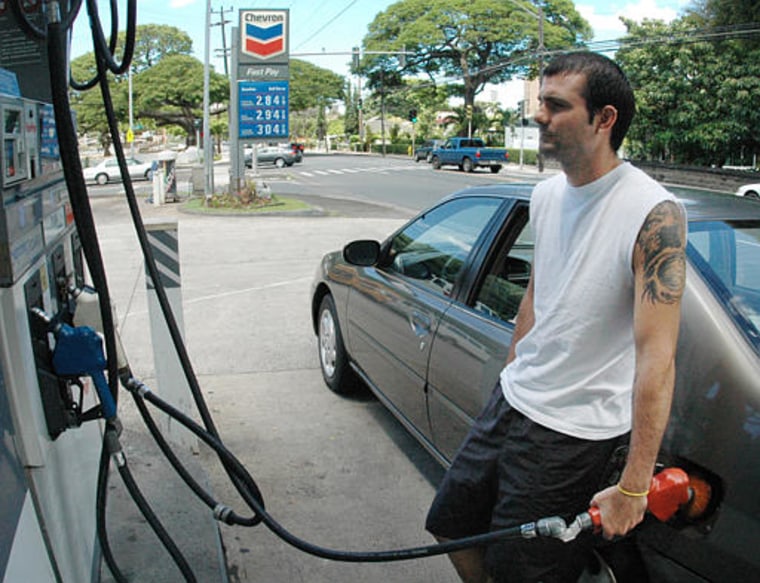In an effort to gain some control over what motorists pay at the pump, Hawaii on Wednesday became the first state in the U.S. to set caps on the wholesale price of gasoline.
The 2004 law authorizing the caps was intended to force Hawaii's two refiners, Chevron Corp. and Tesoro Corp., to set their wholesale prices closer to mainland rates. Proponents of the law said the refiners were taking advantage of the small, isolated market to charge exorbitant prices.
But industry officials and analysts said Hawaii, whose average retail gasoline prices are the highest in the country, now runs the risk of becoming less attractive to suppliers, raising the possibility of supply problems down the road. However, some analysts gave the state credit for developing a pricing model that takes market forces into account.
The state's Public Utilities Commission said Wednesday that, beginning Sept. 1, wholesalers in Honolulu may not charge more than $2.1578 a gallon for regular unleaded, or about $2.74 a gallon when taxes are included. The commission set the caps, which will fluctuate from week to week, at different levels for other islands.
The law does not establish a cap at the retail level. But if retailers keep their usual 12-cent-per-gallon markup, prices for regular unleaded in Honolulu could in theory rise to about $2.86 per gallon.
On Wednesday, the average retail price of regular unleaded in Honolulu was at a record $2.761, some 15 cents above the nationwide average. Statewide, prices average $2.84, the highest in the nation, according to AAA's Web site.
Prices on Maui have already topped $3 a gallon this week.
The caps are based on an index calculated from the five-day average of spot rates from three mainland markets: Los Angeles, New York harbor and the U.S. Gulf Coast.
The commission then adds on allowances for the cost of shipping to the state and for transporting gasoline from Oahu to more remote and less populated islands.
"The purpose of the cap is so that we move with the rest of the country," said Frank Young, a member of Citizens Against Gasoline Price Gouging.
But John Felmy, chief economist of the American Petroleum Institute, the oil industry's main trade group, said Hawaii should be prepared for negative unintended consequences. "They are basically assigning different amounts of revenue to different areas of the supply chain," Felmy said, and that could have a "chilling effect" on attracting supplies or new investment in the market.
"It's a solution in search of a problem," he added.
Gov. Linda Lingle, who unsuccessfully sought repeal of the 2004 law passed by the state Legislature, has said she worries the cap will actually increase prices and create fuel shortages. The governor has the power to suspend the price caps if she determines they would cause a major adverse impact on the economy, public order, or the health, welfare or safety of the people of Hawaii.
Fereidun Fesharaki, an energy expert at the University of Hawaii's East-West Center in Honolulu, said the gas cap was "a stupid idea" that would be bad for competition and, ultimately, consumers.
"It may make one of the refineries shut down and leave Hawaii," Fesharaki said.
But state Sen. Ron Menor, the chief architect of the law, has said he is convinced it will lead to lower prices at the pump and should at least be given a chance.
Chevron and Tesoro did not immediately return calls seeking comment. Chevron owns a 54,000 barrel-a-day refinery in Hawaii and Tesoro has a 95,000 barrel-a-day refinery.
The state Legislature first passed a gas price cap law in 2002 based on the average weekly price on the West Coast, but it was never implemented. Lawmakers in 2004 amended the law to peg the cap to an index of prices around the country.
"The fact that their pricing mechanism is market-related minimizes the risk that a physical shortage would arise," said Tim Evans, senior oil analyst at IFR Energy Services in New York.
"They are attempting to go about this in an intelligent fashion," he added.
But other analysts were less sanguine about the possible damage from interfering in the market.
"It's a slippery slope," said Tom Kloza, director of the Oil Price Information Service in Wall, N.J. "You run the risk of dissuading some folks from marketing in certain areas."
Only time will tell, Kloza added.
